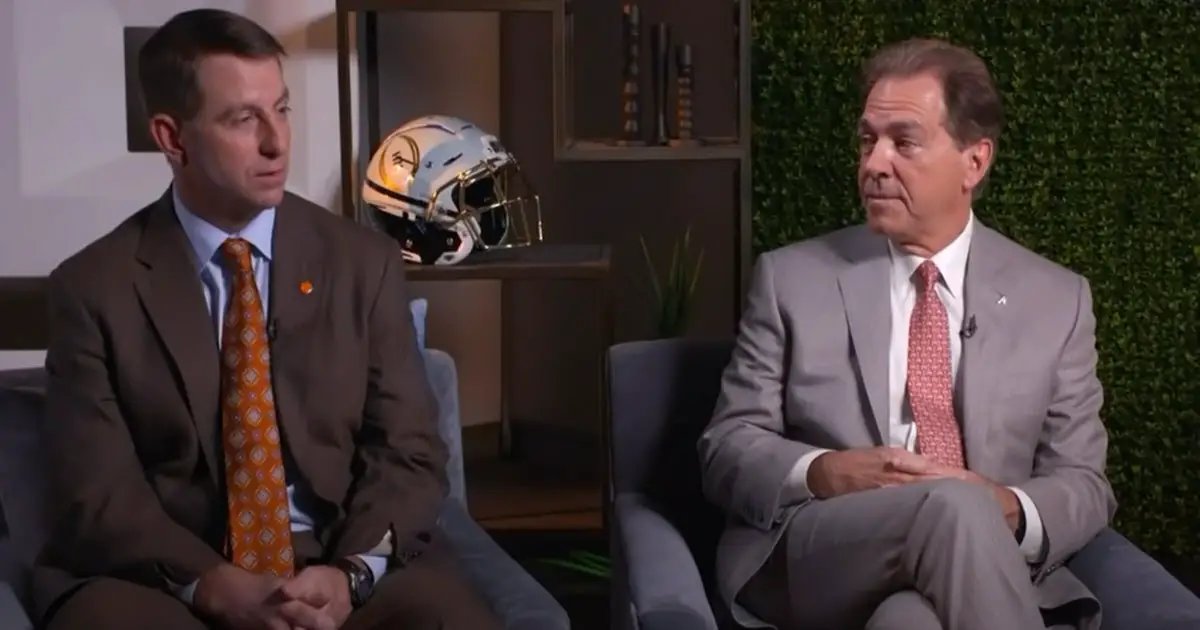Fellow readers, I’m going to let you in on a little secret about myself. I’m a dreamer and a rule breaker!
You see, I woke this morning pondering a possibility that may be legally impossible, morally questionable, but that is–from this sports fan’s perspective at least–quite fascinating.
Join me, if you will, aboard Mr. Rogers’s Trolley of Make-Believe as we ponder the question, What if we capped the salaries of college coaches?
Our pondering begins with the 1998 case Law vs. NCAA. In Law, the NCAA attempted to limit the salaries of some coaching positions. The coaches sued–and won: the court issued an order permanently enjoining the NCAA from limiting coaches’ salaries, reasoning that the collusive act constituted a violation of the Sherman Antitrust Act.

Dabo Swinney (left) is pleased that he beat Nick Saban again, as his salary of 9.3 million per year tops Saban’s measly 8.85 million. (Pre-COVID)
The Sherman Act, sponsored by Ohio Senator John Sherman, was passed in 1890 to prevent monopolistic corporate practices such as price fixing. The Act prohibits two types of “monopolistic” actions. The first includes acts “void of competitive rationale.” The second includes acts that have an “adverse effect on competition.”
Exceptions have been developed over the 130 years of cases interpreting the Sherman Act. Cases such as Rodgers v. Ga. Tech Athletic Assn. have found it acceptable, for example, for companies to “collude” to limit compensation in the form of non-monetary benefits such as air travel, tickets, etc. Absent a judicial exemption, the only ways of implementing industry-wide compensation caps otherwise violative of the Sherman Act are through federal legislation or voluntary, collective compliance by the payees, i.e. through collective bargaining.
In addition to legal issues, there are practical issues with implementing a coaching cap. Larger, more richly-endowed schools have competitive and financial interests in preserving their ability to attract big-name coaches with big-money contracts. And coaches, at least the more highly-paid ones, have an interest in maximizing their financial values in the open market. And let’s not forget the fans–remember, the Sherman Act was designed to protect the consumer–who may receive lower entertainment value with compensation-capped coaches.

Corvallis Oregon
On the other hand, there’s a case to be made that a coaching compensation cap would have long-term benefits for the financial health of college sports. A cap might also make places like Missoula (Go Griz!), Eugene and Corvallis more attractive to big-name coaches, with location and quality of life issues playing a more important role relative to compensation?
As Kristi Dosh suggests in her recent Forbes piece, an agreement among colleges to cap coaching compensation would likely constitute “naked horizontal price fixing,” a per se violation of the Sherman Act. With larger colleges incentivized to retain their bargaining power and coaches benefitting from market-driven salaries, there is likely a lack of practical impetus to accomplish a cap via federal legislation or collective bargaining.
Not that any of that will prevent us rule-breaking trolley-riders from pondering the idea….
Brandon Viall
Missoula, Montana
Top Photo via mrrogers.org

Phil Anderson, the FishDuck.com Volunteer editor for this article, is a trial lawyer in Bend Oregon.
Related Articles:

Brandon Viall was born in Billings, Montana, but has lived in Missoula Montana for most of his 41 years. Brandon graduated from the University of Montana with a bachelor’s degree in English Education in 2003, and a master’s degree in Sports Marketing and Management from Washington State University in 2020.
Brandon is an avid reader of all subjects ranging from science to sports. When not following sports, Brandon is a huge movie buff, gamer, traveler (24 states and London) and writes poetry. In the sports arena, Brandon’s primary focuses are national issues affecting sports, including the NFL and NCAA, along with community outreach and sports.


